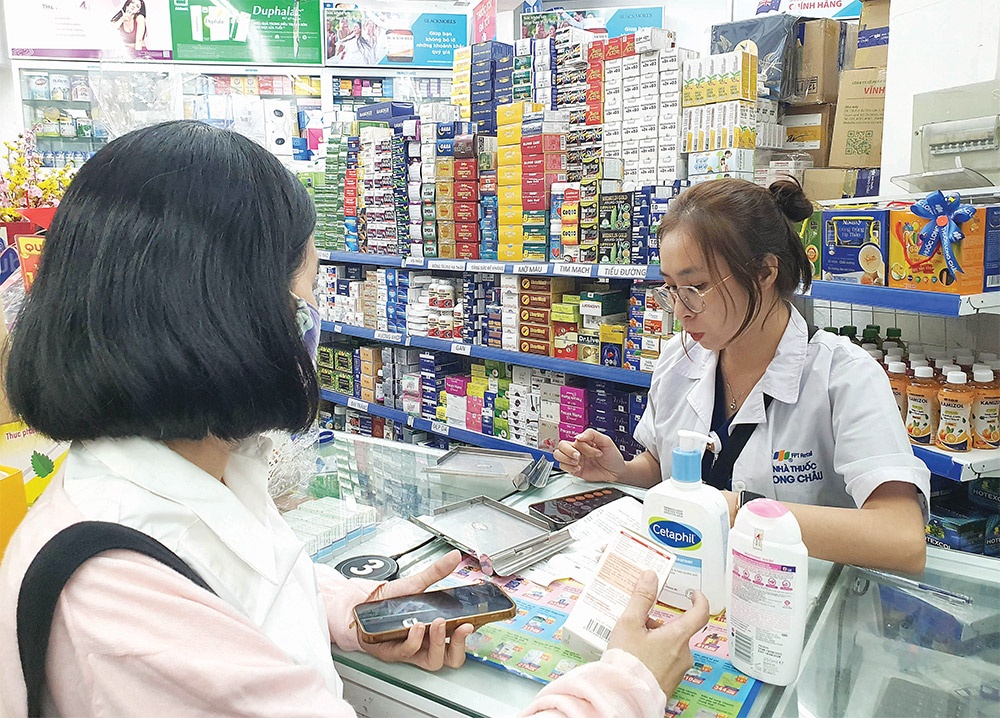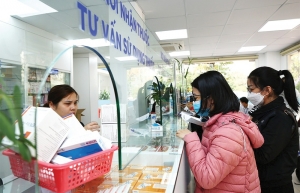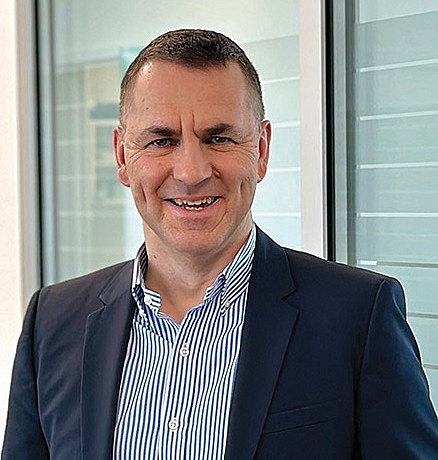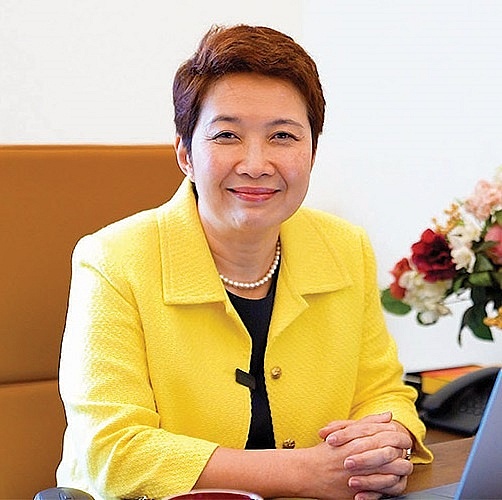Global pharma expects bumper year
 |
| Major pharma groups are able to offer new innovative medicines in Vietnam, photo Le Toan |
Yukinori Tominaga, general director of Daiichi Sankyo Vietnam Co., Ltd. is preparing for more business of oncology products after obtaining GSP standards accreditation for cold storage in its warehouse in the Mekong Delta province of Long An last year.
Tominaga told VIR, “The priorities in the company’s business plans and strategies in Vietnam in 2024 is to increase more access to new medications by our new innovative pharmaceuticals to improve the quality of life for Vietnamese people. We are considering to bring oncology, pain management, and cardiovascular medicines to Vietnam from 2024 onwards.”
As a global pharmaceutical company with corporate origins in Japan, Daiichi Sankyo established a Vietnamese wholly owned subsidiary in 2020 to venture further into the local market, six years after opening a representative office in Ho Chi Minh City.
Tominaga elaborated that the first importation arrived in its warehouse in December 2022 and released as wholesale of pharmaceuticals to Phytopharma in February 2023.
“It is the very first time in Daiichi Sankyo history, and we have more than 100 years of history in Japan, to gain revenues in Vietnam, which is very meaningful to us. It could lead stakeholders to consider further investment here.”
Expansion in focus
Similar to Daiichi Sankyo Vietnam, other multinational corporations like Novartis, Sanofi, GSK, Pfizer, MSD, and others are planning to expand here, keeping partnerships with government agencies, medical associations, and hospitals among key priorities in their strategies ahead.
Over the past year, GSK Vietnam has worked with healthcare professionals, government bodies, and local communities to ensure availability of drugs.
“In 2023, we made notable progress in our key areas of vaccines and general medicines. Our paediatric vaccines portfolio continued protecting half of newborn babies in Vietnam against infectious diseases, while our general medicines treated various health conditions, especially in anti-infectives and respiratory,” said GSK Vietnam president Pham Thi My Lien.
“Our focus remained on positively impacting the health of the Vietnamese population, with the goal of reaching one-third of the population by 2025,” she added.
For GSK, Vietnam is one of the six top-priority markets out of more than 100 markets. “We are pleased to see the development of the nation’s health sector, and with the support of the local biopharmaceutical sector, we will continue to unite science, technology, and talent to bring innovative healthcare solutions to anyone who needs them,” Lien added.
Last year also saw strategic partnerships for Pfizer in Vietnam with a number of hospitals, medical universities, and medical associations. They included deals with Cho Ray Hospital, Bach Mai Hospital, the Vietnam Paediatrics Association, the Vietnam National Heart Association, and Vietnam Vaccine JSC.
Darrell Oh, general manager of Pfizer Vietnam, said, “We successfully brought two new innovative medicines to Vietnam in the anti-infectives therapeutic area. These launching activities reflect our unwavering dedication to delivering quality, safe, and valuable healthcare products, including innovative medicines, to Vietnamese patients.”
He added that last year the company also had a patient-access-programme that supported breast cancer patients with access to Pfizer’s new innovative drugs. In 2024, which marks the 175 years since its founding, Pfizer plans to bring the newest innovative medicines and vaccines to patients in Vietnam.
“Pfizer will also prioritise activities such as creating partnerships with healthcare governmental stakeholders in capability building, updating, and sharing of advanced scientific information, looking for opportunities for clinical activities in Vietnam,” Oh noted.
“Pfizer Vietnam will continue focusing our business where we believe we can have the greatest impact on patients and society – pursuing what we believe to be the most innovative biopharmaceutical therapies and vaccines,” he continued.
Legal improvement path
In late 2023, Minister of Health Dao Hong Lan held a meeting with Swiss Ambassador to Vietnam Thomas Gass to discuss cooperation in the healthcare sector in the context that the Ministry of Health looks to promote cooperation with Switzerland in pharmaceuticals.
It also expects Swiss pharmaceutical enterprises to transfer tech of production of patented drugs, vaccines, and medical biological products which Vietnam cannot yet produce.
The Swiss side has also shown interest in other contents such as the possibilities of foreign-invested enterprises participating in drug distribution, renewable of marketing authorisation (MA) and drug registration licensing, as well as the amended Law on Pharmacy (LoP).
Issues of concerns are among not only Swiss pharma firms but also other multinational corporations.
Darrell Oh of Pfizer said, “We still hope that the upcoming revised LoP and other legislation will create a strong foundation for the development of the pharmaceutical industry. Specifically, this includes shortening the time for reviewing MA dossiers for new innovative drugs and vaccines and eliminating administrative obstacles so that patients can access innovative drugs and vaccines sooner and more effectively.”
At the same time, Oh hopes there are adjusted regulations on the operations of pharmaceutical foreign-funded companies to encourage business development and attract more foreign direct investment in the healthcare sector.
“We strongly believe that the government will consider 2024 as a pivotal year on policy change through amendments, especially the LoP,” he added.
Similarly, Tominaga of Daiichi Sankyo said, “We have utilised special import quotas to import edaravone to Vietnam, which is indicated for ALS treatment. We feel more comfortable to secure supply of products compared with the licence renewals matters in the past, and we do believe these risks can be mitigated more in the future.”
The amended LoP will be submitted to the National Assembly for discussion in the seventh session and for approval in the eighth session later this year.
| Stéphane Jacqmin, evp for Emerging Markets STADA Group
At present, the investment trend in Vietnam’s pharmaceutical industry has seen changes, focusing on innovation, research and development (R&D), clinical trials, and technology transfer. This is aligned with our development strategy which is initiated by the goal of increasing healthcare, and developing factories in Vietnam to supply products not only for Vietnam but also other markets, including the EU. We now have two factories meeting EU standards in Vietnam with the support of German specialists. We believe that technology transfer can make great impacts, contributing to developing Vietnam into a centre of the supply chain in the future. 2023 marked a special year when we opened a new office in Ho Chi Minh City, as STADA is one of the three biggest German investors in Vietnam. The company focuses development on the three pillars of healthcare products, generics, and specialities. As planned in 2024, the first batch of products will be exported to the EU market with Vietnamese origin, reaffirming the product quality of STADA Pymepharco and showing our strong commitment to helping Vietnamese people increase access to high-quality medicines at reasonable prices. We will continue to expand our product portfolio and technology transfer in the upcoming time in Vietnam as part of this effort. Dr. Nguyen Anh Van, chairwoman, Vietlife
There were several outstanding events at Vietlife last year, such as kicking off construction of Thanh Xuan General Hospital. Once in operation, it will be renamed Vietlife International General Hospital, with 300 beds of 5-star international standards. We have also invested in opening two more new general clinics in Hanoi and Ho Chi Minh City, bringing our total number of clinics to four, and increasing the total number of MRI machines to seven, ranking it first in the private clinic system in Vietnam in the number of MRI machines In addition, with our strength in researching and applying nanotechnology in the production of healthcare products, 2023 was also the year we invested much in R&D, with one product completed preparation for clinical research, along with a series of grassroot-level clinical trials for other products. Competition in the market in 2023 grew. In the healthcare sector, we see a wave of investment funds and foreign corporations pouring hundreds of millions of US dollars to acquire healthcare firms in Vietnam. The signs in 2024 show that competition tends to be more stiffening amid global uncertainties, affecting Vietnam’s economy, including the healthcare and pharmaceutical sector as foreign-led groups still see it a lucrative arena. To stand firm and develop more, Vietlife has priorities in our business strategies. They include persistently building and developing a team of good professional doctors; optimising and improving medical services and customers’ experience; and diversifying distribution and sales channels. |
 | Legal landscape adjusted for global pharma groups Multinational corporations operating in Vietnam are expected to benefit from new legal changes in the months to come, after years of delay. |
What the stars mean:
★ Poor ★ ★ Promising ★★★ Good ★★★★ Very good ★★★★★ Exceptional
Themes: Healthcare Platform
- PM outlines new tasks for healthcare sector
- Opella and Long Chau join forces to enhance digestive and bone health
- Hanoi intensifies airport monitoring amid Nipah disease risks
- Cosmetics rules set for overhaul under draft decree
- Policy obstacles being addressed in drug licensing and renewal
Related Contents
Latest News
More News
- PM outlines new tasks for healthcare sector (February 25, 2026 | 16:00)
- Myriad risks ahead, but ones Vietnam can confront (February 20, 2026 | 15:02)
- Vietnam making the leap into AI and semiconductors (February 20, 2026 | 09:37)
- Funding must be activated for semiconductor success (February 20, 2026 | 09:20)
- Resilience as new benchmark for smarter infrastructure (February 19, 2026 | 20:35)
- A golden time to shine within ASEAN (February 19, 2026 | 20:22)
- Vietnam’s pivotal year for advancing sustainability (February 19, 2026 | 08:44)
- Strengthening the core role of industry and trade (February 19, 2026 | 08:35)
- Future orientations for healthcare improvements (February 19, 2026 | 08:29)
- Infrastructure orientations suitable for a new chapter (February 19, 2026 | 08:15)



 Tag:
Tag:



















 Mobile Version
Mobile Version